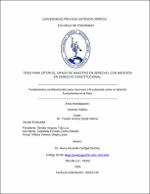Mostrar el registro sencillo del ítem
Fundamentos constitucionales para reconocer a la eutanasia como un derecho fundamental en el Perú
| dc.contributor.advisor | Carbajal Sánchez, Henry Armando | |
| dc.contributor.author | Zarate Merino, Yusbert Antony | |
| dc.creator | Zarate Merino, Yusbert Antony | |
| dc.date.accessioned | 2023-12-06T20:47:45Z | |
| dc.date.available | 2023-12-06T20:47:45Z | |
| dc.date.issued | 2023 | |
| dc.identifier.uri | https://hdl.handle.net/20.500.12759/13811 | |
| dc.description.abstract | Es objeto de estudio la regulación de la Eutanasia, concretamente la determinación de sus argumentos constitucionales como clara manifestación de la toma de decisiones sobre argumentos éticos, transparentes y el respeto a la autonomía de voluntad de los pacientes con enfermedades terminales, a fin de contar con un marco legal claro y con regulaciones precisas que establezcan los procedimientos y salvaguardias necesarias para evitar abusos y proteger los intereses del paciente con enfermedad terminal. La investigación se sustenta en argumentos doctrinarios, así como a la luz del emblemático caso de Ana Estrada, encontrando también respaldo en las posiciones de los especialistas en el estudio, considerando como enunciado del problema: ¿Qué fundamentos constitucionales sustentará el reconocimiento de la eutanasia como un Derecho fundamental en el Perú? Iniciado y finalizado la ejecución del estudio, empleando una metodología acorde con el tipo de investigación se llegó a contrastar la hipótesis formulada en el sentido que: los fundamentos constitucionales para reconocer la eutanasia como un derecho fundamental en el Perú son: El respeto y la defensa constitucional a la Dignidad de la Persona Humana; el derecho a morir dignamente y a no ser sometido tratos crueles e inhumanos. Lo antes señalado se sustenta en resultados, ampliamente discutidos, advirtiendo que lo advertido por el investigador es un problema latente, existente en el ámbito jurídico y social, necesaria de una regulación inmediata, concordante a la luz del caso emblemático de Ana Estrada. Finalizado el estudio se considera presentar resultados por los objetivos planteados, los mismos que se conducen en las conclusiones y en la recomendación relacionada con la propuesta de regulación legal cuyo texto también se consigna en el presente informe, como clara expresión al respeto y defensa constitucional a la Dignidad de la Persona Humana; el derecho a morir dignamente y a no ser sometido tratos crueles e inhumanos | es_PE |
| dc.description.abstract | The regulation of Euthanasia is the object of study, specifically the determination of its constitutional arguments as a clear manifestation of decision-making on ethical, transparent arguments and respectfor the autonomy of will of patientswith terminal illnesses, in order to Ontar with a clear legal framework and precise regulations that establish the necessary procedures and safeguards to prevent abuses and protect the interests of the terminally ill patient. The research is based on doctrinal arguments, as well as in the light of the emblematic case of Ana Estarda, also finding support in the positions of the specialists in the study, considering as a problem statement: What constitutional foundations will sustain the recognition of euthanasia as a fundamental right in Peru? Once the execution of the study began and ended, using a methodology according to the type of research, the hypothesis formulated in the sense that: the constitutional foundations to recognize euthanasia as a fundamental right in Peru are: Respect and constitutional defense of the Dignity of the Human Person; the right to die with dignity and not to be subjected to cruel and inhuman treatment. The above is based on results, widely discussed, warning that what the researcher warned is a latent problem, existing in the legal and social field, necessary for immediate regulation, consistent in the light of the emblematic case of Ana Estrada. Once the study is completed, it is considered to present results for the objectives set, the same ones that are conducted in the conclusions and in the recommendation related to the proposal of legal regulation whose text is also included in this report, as a clear expression of respect and constitutional defense of the Dignity of the Human Person; the right to die with dignity and not to be subjected to cruel and inhuman treatment | es_PE |
| dc.description.uri | Tesis | es_PE |
| dc.format | application/pdf | es_PE |
| dc.language.iso | spa | es_PE |
| dc.publisher | Universidad Privada Antenor Orrego | es_PE |
| dc.relation.ispartofseries | M_DER_229 | |
| dc.rights | info:eu-repo/semantics/closedAccess | es_PE |
| dc.rights.uri | https://creativecommons.org/licenses/by/4.0/ | es_PE |
| dc.source | Universidad Privada Antenor Orrego | es_PE |
| dc.source | Repositorio Institucional | es_PE |
| dc.subject | Fundamentos | es_PE |
| dc.subject | Constitucionales | es_PE |
| dc.subject | Eutanacia | es_PE |
| dc.title | Fundamentos constitucionales para reconocer a la eutanasia como un derecho fundamental en el Perú | es_PE |
| dc.type | info:eu-repo/semantics/masterThesis | es_PE |
| thesis.degree.grantor | Universidad Privada Antenor Orrego. Escuela de Postgrado | es_PE |
| thesis.degree.name | Maestro en Derecho con Mención en Derecho Constitucional | es_PE |
| thesis.degree.discipline | Maestría en Derecho | es_PE |
| dc.subject.ocde | http://purl.org/pe-repo/ocde/ford#5.05.00 | es_PE |
| renati.advisor.orcid | https://orcid.org/0000-0002-3449-688X | es_PE |
| renati.author.dni | 47239480 | |
| renati.advisor.dni | 18161467 | |
| renati.type | http://purl.org/pe-repo/renati/type#tesis | es_PE |
| renati.level | http://purl.org/pe-repo/renati/level#maestro | es_PE |
| renati.discipline | 421297 | es_PE |
| renati.juror | Benites Vásquez, Tula Luz | |
| renati.juror | Castañeda Ferradas, Carlos Roberto | |
| renati.juror | Villena Veneros, Sheyla Lisset | |
| dc.publisher.country | PE | es_PE |




